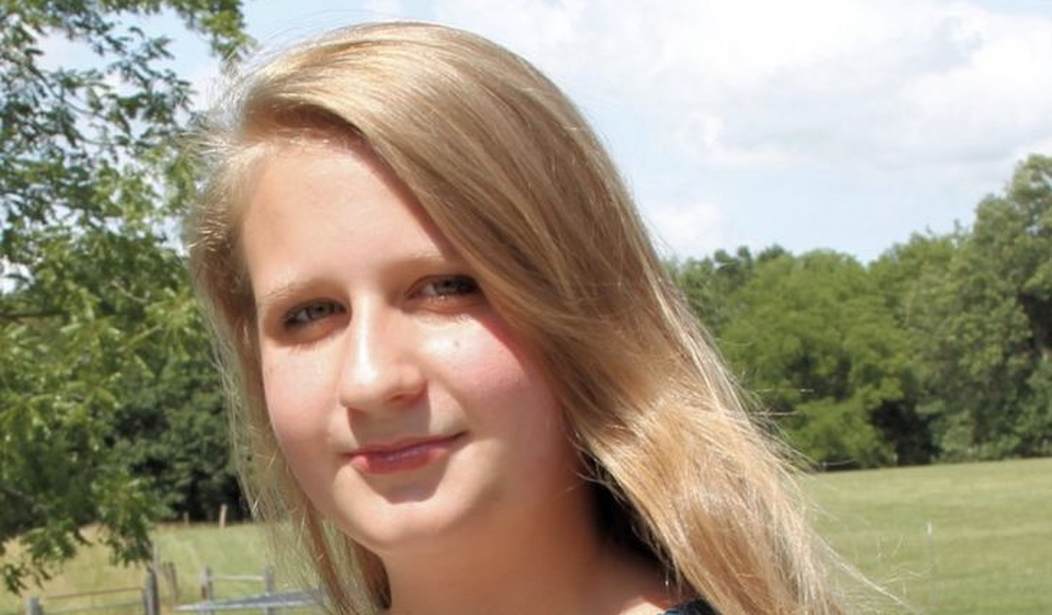This report is part 29 of an investigative series looking into reported corruption in the Missouri Judiciary and family courts. For the rest of the investigation visit the catalog here.
Jennifer Williams will face a jury in the wrongful death lawsuit brought by Cynthia (Haynes) Randolph on behalf of her deceased daughter Mikaela Haynes, a 13-year-old embroiled in Missouri’s family court nightmare who took her own life rather than go back to the father who sexually abused her. Williams, an attorney, was assigned to Mikaela as her guardian ad litem (GAL) during the vicious court battle her family suffered trying to get away from her convicted sex-offending father, Charles Haynes. Haynes is currently serving a seven-year sentence in a Missouri prison for the forcible sodomy of Mikaela’s step-sister, Melissa.
Charles Haynes was credibly accused of that crime when Williams ignored all evidence of his abuse and placed Mikaela in the care of his 90-year-old mother, who gave Haynes full access to Mikaela. After unsuccessfully trying to alert doctors, judges, DFS, and others in authority that she was being sexually abused, Mikaela learned on Nov. 23, 2018, that her GAL, Williams, would seek Haynes’ probation on Nov. 26, 2018, which would guarantee that Haynes would not be sentenced to serve a prison term. Fearing ending up in Haynes’ custody after sentencing and being sexually abused again, Mikaela took her life. PJ Media covered that story thoroughly in several parts in the linked articles here, here, and here.
Randolph brought a wrongful death suit against Jennifer Williams, Charles Haynes, and Bernice Haynes, Charles’s mother. Williams attempted to have the case dismissed claiming that she owed no duty to the child she was appointed to help. A judge simply disagreed.
Williams argues that Plaintiff has failed to establish Williams owed a duty to protect M.H. from harm. Plaintiff responds that Williams’ assertion that she owed no duty to M.H. is the antithesis of the extensive body of Missouri law imposing specific duties on GALs. The undersigned discussed Williams’ role and obligations to M.H. as her GAL extensively in its previous order denying Williams’ motion to dismiss. (Doc. 61.) The Court noted that the role of the GAL in Missouri “is a hybrid of the traditional and attorney-client roles, although closer to the traditional role than the strict attorney-client or advocate role.” State ex rel. Bird v. Weinstock, 864 S.W.2d 376, 385 (Mo. App. E. Dist. 1993). Missouri courts “have consistently held that the duty of a guardian ad litem is to protect the best interests of the child.” Id. Williams was appointed as M.H.’s GAL, rather than her personal attorney, pursuant to Missouri statute, Mo. Rev. Stat. § 452.423. This statute requires the GAL, among other duties, to “[r]equest the juvenile officer to cause a petition to be filed in the juvenile division of the circuit court if the guardian ad litem believes the child alleged to be abused or neglected is in danger.” Mo. Rev. Stat. § 452.423.3(3). This provision alone establishes that Williams owed a duty to M.H. to protect her from harm. Thus, Plaintiff has sufficiently alleged Williams owed a duty to M.H.
Williams also tried to argue that she can’t be held negligent. That didn’t fly either.
Plaintiff argues that Williams acted negligently in violation of the standard of care when she took the following actions: intimidated and threatened M.H. while reunifying M.H. with her abusive father, prevented M.H. from testifying in her father’s criminal case about the sexual abuse M.H. had suffered, and advocated and testified for Charles in his criminal trial. She contends that these acts were outside the scope of Williams’ GAL duties. Williams argues that Harvey is not supportive of Plaintiff’s position…
The Court further finds that Plaintiff has sufficiently alleged the elements of a negligence claim in Count I. As noted in Harvey, to state a claim for wrongful death based on negligence, Plaintiff must prove the existence of a duty to be performed by Williams, a breach of that duty, and a resulting injury caused by the breach. 2021 WL 4552135, at *3. Plaintiff has alleged that Williams owed a duty to M.H., that Williams breached that duty, and that the breach of Williams’ duty was the cause of M.H.’s death.
Williams has lost her bid to get out of facing the music. Next up is a jury trial.
In sum, Plaintiff has sufficiently alleged that Williams realized or should have realized her conduct involved an unreasonable risk of causing M.H. distress, and that M.H. suffered emotional Case: 1:21-cv-00160-ACL Doc. #: 129 Filed: 05/31/23 Page: 11 of 12 PageID #: 1873 -12- distress or mental injury that is medically diagnosable and sufficiently severe to be medically significant. As such, she has stated a plausible claim for NIED, and Defendant’s Motion for Judgment on the Pleadings as to Count I will be denied.
Cynthia’s attorney, Evita Tolu, commenting on the Court’s decision, told PJ Media, “The Court’s ruling is a great victory for Missouri children and for child safety advocates to use against lawyers who violate Missouri child protection statutes, children’s trust, and confidentiality. Williams’ meritless ‘no duty owed to the child’ arguments resulted in a strong decision from the Court, showing the Court’s commitment to protecting Missouri children from lawyers like Williams, entrusted by law to safeguard children from any injuries but who instead harm children driving them to suicide.”
Tolu’s client Randolph intends to try the case in front of the jury of her peers because she wants Mikaela’s short life to have a lasting impact on Missouri’s family court system which is so full of horror stories like hers. Strong child protection cases like this will prevent future tragedies like what happened to Mikaela Haynes. The Court’s decision sends a strong message to attorneys who fail to guard the children’s best interests.
This is only the second case in Missouri to make it past the qualified immunity claims that GALs rely on to cover up their negligent behavior. The other is awaiting a decision by the 8th Circuit Court of Appeals to see if the case against Judge Eric Eighmy, who terrorized and jailed the Rockett children, will go forward. The Rocketts and Mikaela Haynes are only three of hundreds if not thousands of children who were injured by GALs like Williams. None of the many other lawsuits filed in Missouri against corrupt GALs and judges have made it past the immunity hurdle.
This case has garnered much attention, including that of a popular body language channel on YouTube that did an excellent analysis of Charles Haynes’ deposition from prison regarding his daughter that was taken during his divorce proceeding.










Join the conversation as a VIP Member